Italy migrant boat crash highlights decades of failed policy
- Published
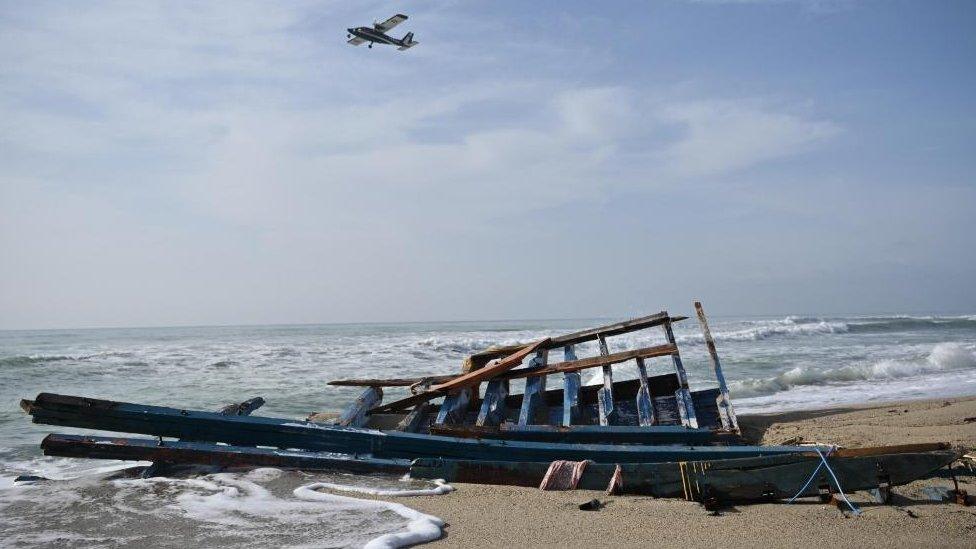
Pieces of wood and debris continued to wash up onto the beach in the days after the boat broke apart
The white coffins lined up in the sports hall of the southern Italian town of Crotone silently bear witness to the latest tragedy in the Mediterranean Sea.
The sun had barely risen on Sunday morning when the first bodies were discovered, washed up on the beach nearby, after a small wooden boat carrying about 200 people from Turkey smashed into rocks in turbulent seas, killing at least 67 people. More are missing and feared dead.
In recent years, similar scenes have played out repeatedly at Europe's southern border, as tens of thousands of people fleeing war, poverty, and persecution risk their lives to cross the water in search of a better future.
Last week's disaster comes exactly a decade after one of the deadliest migrant shipwrecks in the Mediterranean. In 2013, a heavily overcrowded vessel carrying migrants from Libya sank off the coast of the small Italian island of Lampedusa, killing 368 people.
Back then, the tragedy brought to light the desperation and danger faced by those seeking refuge in Europe, sparking widespread outrage and demand for change across the continent.
"We will do anything we can, with the means that we have, to change the situation," said Jose Manuel Barroso, who was then the President of the European Commission.
The Lampedusa tragedy spurred the Italian government to launch Mare Nostrum, a search-and-rescue mission aimed at preventing further loss of life at sea, on 18 October 2013. The operation, which involved the deployment of naval vessels and aircraft to the Mediterranean, only lasted one year.
Since then, less efficient measures have been put in place, and without real unified action by the European Union, which has partly addressed the problem by outsourcing the management of migrant flows outside its borders.
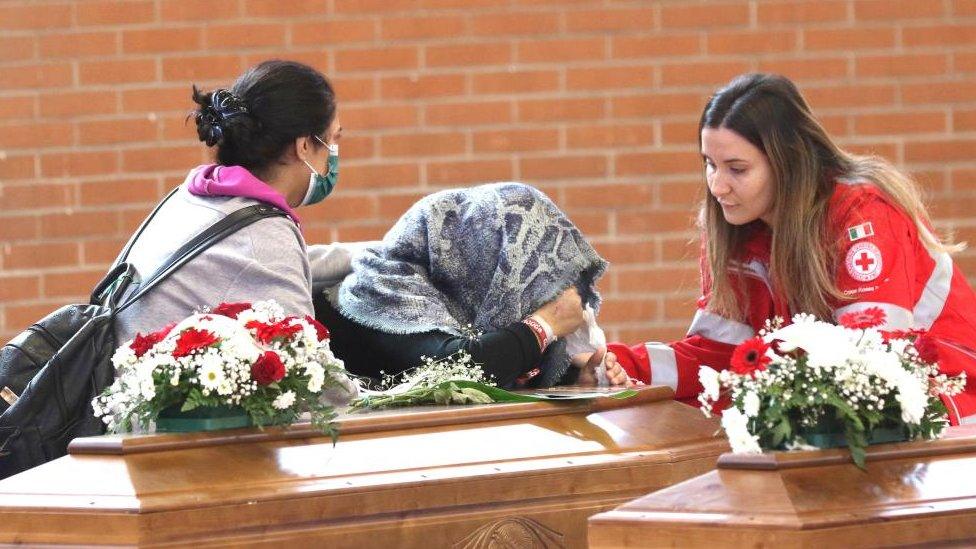
Victims' families mourned the coffins of their loved ones in a funeral home set up in a sports hall in Crotone
"Since the Lampedusa tragedy, unfortunately, nothing has changed," said Francesco Creazzo, a spokesman for SOS Mediterranee, a non-governmental organisation (NGO) engaged in search and rescue operations in the Mediterranean.
"People keep leaving, and they keep dying. The horrors that are described to us by people passing through Libya are unspeakable. Women who became pregnant after being raped in detention centres escape and drown, young children remain alone in the world.
"And with political instability worsening outside Europe's borders, the desperation of migrants is unheard of," he said.
After the tragedy, Giorgia Meloni, Italy's Prime Minister, expressed "deep sorrow" and said in an interview that she sent a letter to EU leaders calling for immediate action by the bloc to stop boat migrants trips to Europe.
"The only way to tackle this issue seriously, with humanity, is to stop the departures," Ms Meloni said in an interview.
Domestically, however, Ms Meloni and her government face allegations that Italian authorities could have rescued the migrants from the vessel well before disaster struck.
Italy has progressively shifted from conducting search and rescue operations to adopting a tough stance on migration - and a more hostile approach towards NGOs involved in rescue. It has imposed restrictions, criminal investigations, detention of ships and fines on some of these organisations.
About 20,000 people are believed to have died in the Mediterranean over the last decade and official figures show that thousands continue to embark on the perilous journey every week, despite the measures in place.
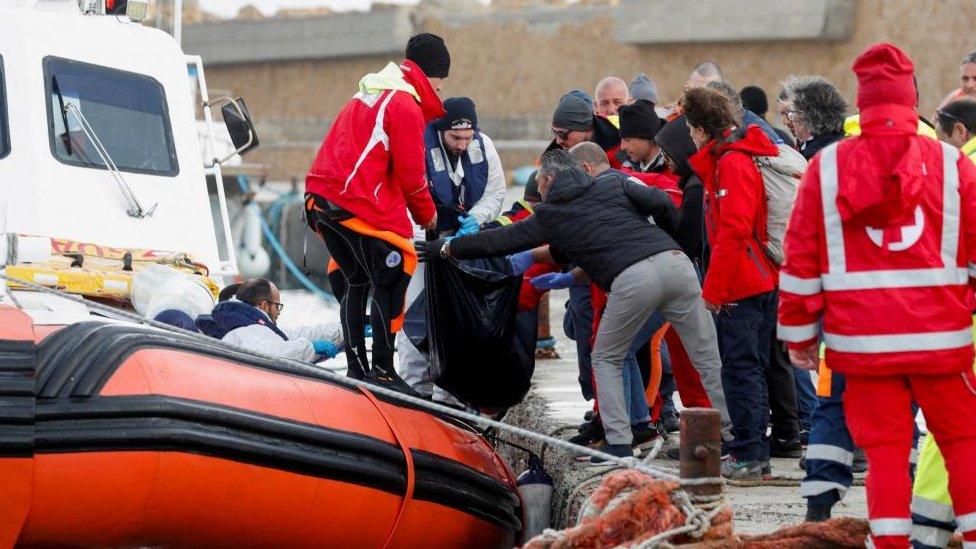
A coast guard boat carrying bodies arrives in port after the shipwreck
More than 14,400 migrants have arrived in Italy by boat this year so far, compared to 5,470 in the same period last year.
"It's up to us [NGOs] to rescue them when they are at sea because no one else is doing it," Mr Creazzo said.
The shift towards a more hostile approach has happened amid an ongoing debate on how to address the migration crisis in a humane and sustainable manner.
"The migrant crisis is a complex and multi-faceted issue, driven by economic, social and political pressures that have yet to be effectively addressed," said Eleonora Camilli, a writer specialising in migration.
"But the human toll of this crisis is painfully clear, as well as the failure to act."
Designated routes allow migrants to travel safely and legally from conflict zones to their destination countries. The so-called humanitarian corridors, typically established between governments, aid organisations and religious groups, and can offer a lifeline for those eligible for asylum.
However, analysts point out that these routes are insufficient, and people are still forced to take dangerous journeys or rely on smugglers.
"People fleeing war-torn countries or other critical situations are often in a hurry and make do as they can," Ms Camilli said.
"For example, since the Taliban took control of the country, some Afghan activists and women cannot afford to wait and leave as soon as possible, how they can. Even those who are entitled to asylum therefore can find themselves caught in a spiral of endless journeys and danger."
Back in Crotone, the group of survivors of the deadly shipwreck and their families are still struggling to come to terms with the trauma and the loss of they loved ones.
Among them are Mohammed and Aladdin, two young men from Afghanistan who drove for 24 hours from Germany. They came to meet their uncle, who was on the boat and whose wife and three children all died at sea.
"These are very difficult hours for all of us, it is unthinkable to see so much pain all together in one room," said Maria Eliana Turno, a psychologist with Médecins Sans Frontières who is looking after the survivors.
"Whole families have been broken. The pain is insurmountable, people are confused, devastated, and agonising over what to do."
Related topics
- Published27 February 2023
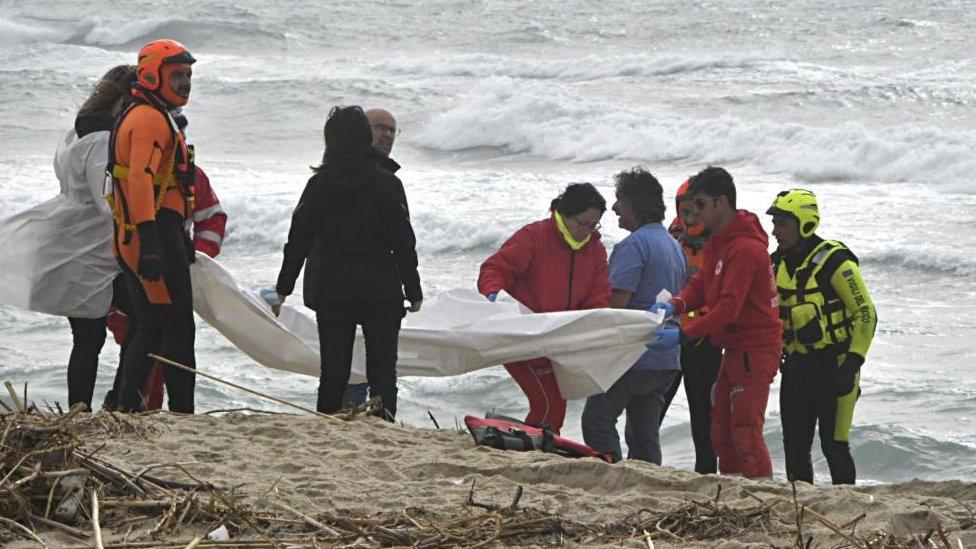
- Published1 March 2023
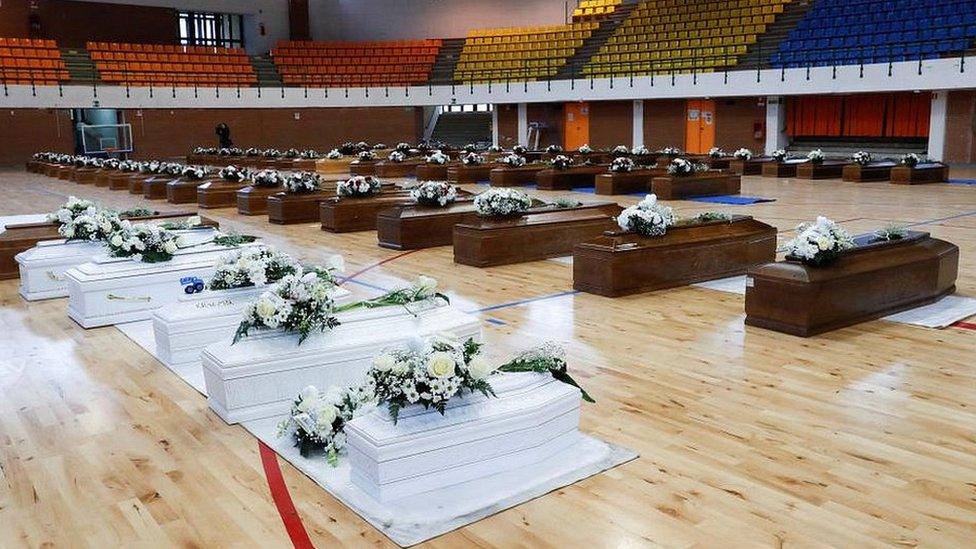
- Published2 March 2023
